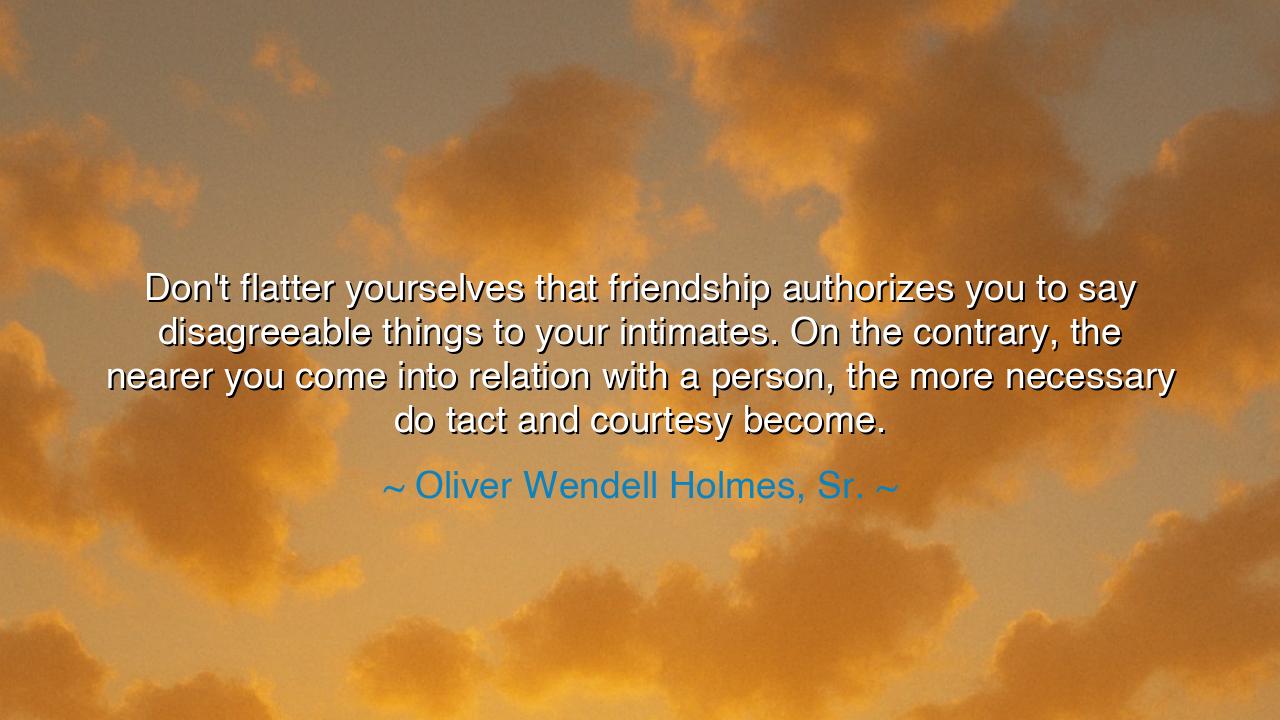
Don't flatter yourselves that friendship authorizes you to say
Don't flatter yourselves that friendship authorizes you to say disagreeable things to your intimates. On the contrary, the nearer you come into relation with a person, the more necessary do tact and courtesy become.






In the wise and measured words of Oliver Wendell Holmes, Sr., we find a truth both delicate and profound: “Don’t flatter yourselves that friendship authorizes you to say disagreeable things to your intimates. On the contrary, the nearer you come into relation with a person, the more necessary do tact and courtesy become.” In this saying, Holmes speaks as a physician of both the body and the heart. He warns us that friendship is not a license for cruelty disguised as honesty, nor a stage for self-righteousness. Rather, the closer we draw to another soul, the more sacred becomes our responsibility to speak with kindness, tact, and grace. For words, though light as breath, can wound deeper than any blade, and the wounds inflicted by those we love most are the hardest to heal.
The origin of this wisdom lies in Holmes’s dual life as a man of science and of letters. Living in the 19th century, he was both a physician and a poet, a thinker who saw the deep connection between the anatomy of the body and the anatomy of the spirit. In his time, friendships among scholars and artists were passionate and intellectual, yet often harsh in candor. Holmes saw how easily affection could be bruised by careless truth — how friends, believing themselves entitled by intimacy, would cast aside courtesy, forgetting that closeness magnifies the power of every word. Thus he wrote this admonition, not to weaken friendship, but to strengthen it by tempering truth with compassion.
Friendship, he reminds us, is a living thing — tender, complex, and vulnerable. It thrives not on bluntness, but on respect. It does not require that we always agree, but it demands that we speak with love. Many deceive themselves, thinking that honesty alone sustains friendship. Yet honesty without tact is arrogance; truth without courtesy is cruelty. The wise understand that love must polish truth as one polishes a precious gem — not to hide its brilliance, but to make it shine without cutting. To speak truth with grace is the highest art of friendship.
Consider the story of Abraham Lincoln and his Secretary of War, Edwin Stanton. The two men began as bitter rivals; Stanton once insulted Lincoln publicly, calling him a “long-armed ape.” Yet when Lincoln became President, he appointed Stanton to one of the most powerful positions in his cabinet. Over years of trial and war, they became not only partners, but true friends. And though they often disagreed fiercely, Lincoln never spoke to Stanton with disdain or anger. He tempered his authority with courtesy and his honesty with gentleness. When Lincoln was assassinated, it was Stanton who wept at his bedside, saying, “Now he belongs to the ages.” Their friendship endured not because they were always kind in thought, but because they were always kind in word.
Holmes’s teaching, then, is not to silence truth, but to sanctify it. The deeper our intimacy with another soul, the greater our power to uplift or destroy them. A stranger’s harsh word may sting and be forgotten; a friend’s can break the heart. Therefore, the closer the bond, the greater the need for tact — that noble art of saying difficult things without wounding, of holding truth and love in perfect balance. To be tactful is not to be false; it is to be wise enough to measure the strength of another’s heart before you speak.
This lesson also reminds us that friendship, though built on trust, must never lose its reverence. As love grows, familiarity tempts us to carelessness. We speak without thought, jest too freely, presume too much upon the affection of another. But true friendship, like a sacred fire, demands both warmth and restraint. The ancients understood this. The philosopher Seneca once said, “True friendship always behaves with modesty.” For love that endures must honor boundaries — not of distance, but of respect.
And so, my child, take this wisdom to heart: let your friendship be tender, not reckless. When you speak truth, do so as one handling something holy. Choose your words not to conquer, but to heal; not to prove, but to preserve. Remember that the tongue of a friend carries great power — it can destroy what years of affection have built. Let your speech, therefore, be like a physician’s touch — firm, yet gentle; precise, yet merciful.
For in the end, as Oliver Wendell Holmes teaches, tact and courtesy are not chains that bind friendship, but wings that lift it higher. The closer you stand to another soul, the more softly you must tread, lest you bruise what you mean to bless. To love deeply is to speak wisely, and to speak wisely is to love well. Thus will your friendships endure — not as fleeting alliances, but as bonds eternal, forged in truth, tempered by grace, and sealed in kindness.






AAdministratorAdministrator
Welcome, honored guests. Please leave a comment, we will respond soon